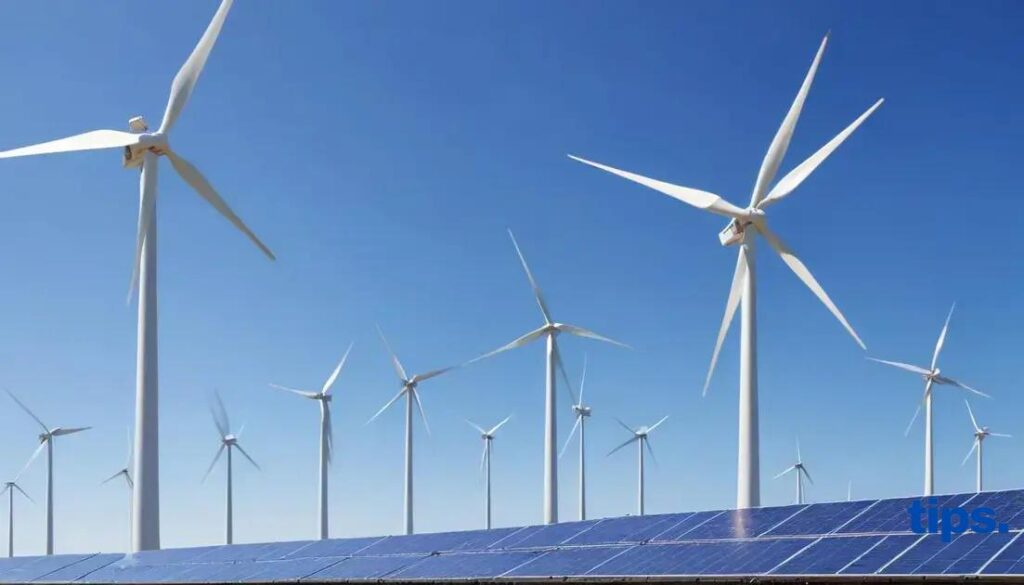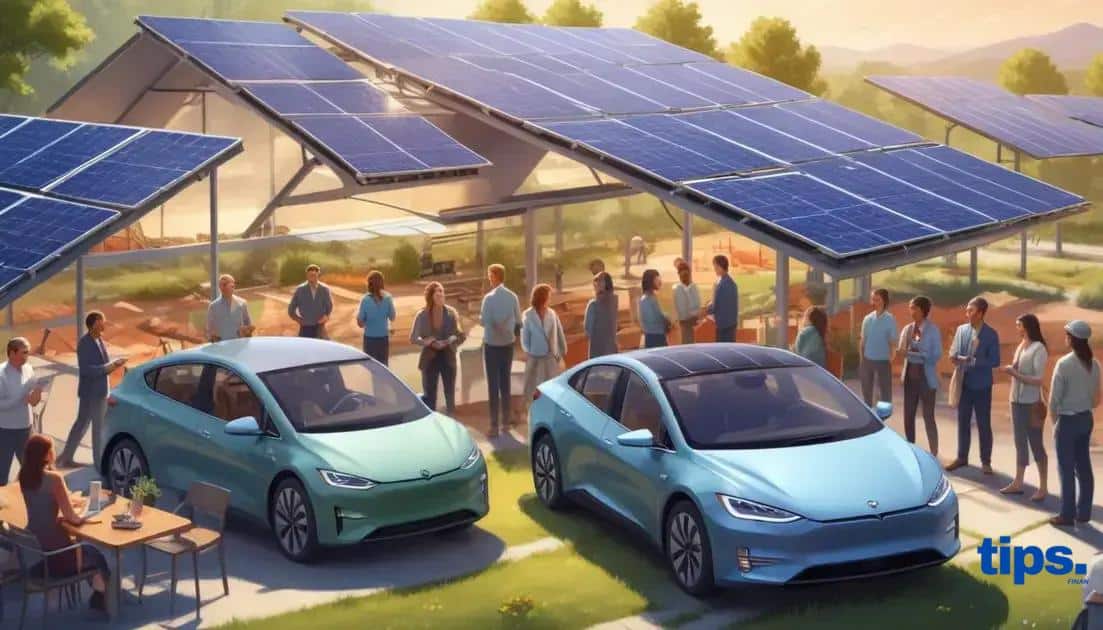Energy policy shifts: Understanding the changes ahead

Anúncios
Energy policy shifts significantly impact the environment, economy, and technological innovation, driving the transition towards sustainable energy sources and influencing public perception and investment opportunities.
Energy policy shifts are gaining momentum, affecting everything from our daily lives to global strategies. Have you thought about how these changes might influence your energy consumption and sustainability efforts? In this article, we’ll dive into the factors driving these important shifts.
Anúncios
Understanding energy policy shifts
Understanding energy policy shifts requires looking at the changing landscape of energy production and consumption. These shifts significantly impact environmental regulations, economic strategies, and technological advancements.
Countries around the world are adapting to new energy realities. Some are shifting towards renewable sources, while others are adjusting fossil fuel policies to balance economic growth and environmental needs.
What Drives Energy Policy Shifts?
Key factors influencing these energy policy shifts include:
Anúncios
- Environmental concerns, such as climate change and pollution.
- The availability of new technologies, such as solar and wind energy.
- Economic pressures and the need for energy security.
As a result, governments and organizations often make critical decisions that shape the future of energy use.
For further details on the impact of energy policies, you can visit the IEEE Energy Policy site for comprehensive information.
Historical context of energy policies
The historical context of energy policies provides insights into how past events shape current energy strategies. For decades, energy policies have evolved in response to economic, technological, and environmental factors.
Initially, energy policies focused on maximizing supply, often prioritizing fossil fuels. Over time, concerns about climate change and sustainability have shifted focus towards renewable energy sources.
Key Milestones in Energy Policy History
Several significant events have catalyzed changes in energy policies:
- The 1970s oil crisis highlighted vulnerabilities in energy dependence.
- The 1992 Earth Summit brought global attention to sustainable practices.
- The Paris Agreement of 2015 set ambitious targets for reducing carbon emissions.
These milestones reflect a growing awareness of the finite nature of fossil fuels and the need for sustainable solutions.
For more comprehensive insights into the evolution of energy policies worldwide, you can visit the IEEA website, which offers extensive resources.
Key players in energy policy changes
The key players in energy policy changes include various stakeholders who influence decisions at national and international levels. These players shape the energy landscape through legislation, innovation, and advocacy.
Governments often lead the charge, drafting policies that encourage sustainable practices. However, they are not alone in this effort.
Major Influencers in Energy Policy
Several groups and entities significantly impact energy policies:
- Government agencies: These organizations create regulations and standards that govern energy production and consumption.
- Environmental organizations: Advocacy groups push for policies that protect the environment and promote renewable energy.
- Private sector companies: Energy producers and technology firms invest heavily in research and development, guiding innovation in the energy sector.
The collaborations and conflicts between these players can lead to rapid changes in energy policies, especially as public awareness of climate issues increases.
For a deeper understanding of the roles of these key players, you can explore resources on the Energy Policy Institute website.
The impact of energy policy on the environment

The impact of energy policy on the environment is profound and far-reaching. Energy decisions directly influence air quality, water resources, and biodiversity.
Policies that promote renewable energy sources can significantly reduce greenhouse gas emissions and lessen our carbon footprint.
Environmental Effects of Energy Policies
Here are some key effects of various energy policies on the environment:
- Air quality: Transitioning from fossil fuels to cleaner energy improves air quality and public health.
- Water conservation: Sustainable energy practices reduce the strain on water resources and protect aquatic ecosystems.
- Biodiversity: Protecting natural habitats from industrial energy projects supports biodiversity and preserves species.
Adopting comprehensive energy policies is crucial for fostering a healthier environment.
For further information on these environmental impacts, visit the EPA Energy website, where you can find resources and data.
| Category | Summary | Example/Source |
|---|---|---|
| What Drives Change | Driven by climate, tech, economy | IEEE Energy Policy |
| Historical Shifts | Events sparked energy reform | Oil Crisis, Earth Summit, Paris |
| Key Players | Govs, NGOs, energy firms lead | Energy Policy Institute |
| Environmental Impact | Cleaner energy helps ecosystems | EPA Energy |
| Economic Impact | Creates jobs, shifts markets | IRENA Reports |
| Technology Role | Tech makes clean energy viable | U.S. DOE |
| Public Perception | People influence policy shifts | ACEEE Studies |
| Future Trends | Focus on net zero and access | World Resources Institute |
Economic implications of energy policy shifts
The economic implications of energy policy shifts are significant and can affect various sectors, from job creation to market stability. These shifts often reflect the changing dynamics of global energy markets.
Understanding these economic changes helps stakeholders make informed decisions and adapt to new realities.
Key Economic Effects
Energy policy shifts can lead to several notable economic effects:
- Job creation: Transitioning to green energy can create new job opportunities in renewable sectors, such as solar and wind energy.
- Market volatility: Changes in energy policies can cause fluctuations in energy prices, impacting both consumers and businesses.
- Investment opportunities: New policies may attract investments in innovative technologies, further driving economic growth.
These economic implications highlight the importance of carefully designed energy policies that promote sustainability and stability.
For more detailed analyses of these economic factors, explore the IRENA publications, which provide valuable insights on renewable energy’s role in economic development.
Technological advances influencing energy strategies
Technological advances are significantly influencing energy strategies around the world. Innovations in technology are transforming how energy is produced, distributed, and consumed.
These changes not only improve efficiency but also promote sustainability across the energy sector.
Key Technological Innovations
Several advances are reshaping energy strategies:
- Renewable energy technologies: Innovations in solar, wind, and hydro energy make it more viable and cost-effective.
- Smart grid systems: These technologies enhance grid reliability and help manage energy flow more effectively.
- Energy storage solutions: Advances in battery technology enable better energy storage, making renewable energy sources more dependable.
These technologies are not only improving energy efficiency but also driving down costs and paving the way for a cleaner energy future.
For more information about the latest technological developments in energy, check out the U.S. Department of Energy website, which offers updates and insights on emerging technologies.
Public perception and energy policy
Public perception plays a crucial role in shaping energy policy. How people view energy sources and sustainability impacts political decisions and initiatives.
Understanding these perceptions helps policymakers design strategies that align with public interests.
Factors Influencing Public Perception
Several factors contribute to how the public perceives energy policies:
- Education and awareness: Public knowledge about energy issues can drive support for renewable energy initiatives.
- Media coverage: The way media reports on energy topics can influence public opinion significantly.
- Personal experience: Local energy developments, such as wind farms or solar installations, affect how communities feel about energy policies.
Addressing public concerns and misconceptions can lead to more effective energy strategies.
For further insights on public perception and energy policy, visit the ACEEE website, which offers comprehensive studies and analysis on these topics.
Future trends in global energy policies

Future trends in global energy policies are shaped by ongoing innovation, environmental concerns, and economic shifts. As the world moves towards sustainability, these policies evolve to address new challenges and opportunities.
Understanding these trends is essential for businesses and governments to stay ahead in the rapidly changing energy landscape.
Emerging Trends in Energy Policies
Several key trends are expected to define future energy policies:
- Decarbonization: Many countries aim for net-zero emissions by 2050, driving policies that support renewable energy development.
- Electrification: Increased reliance on electric vehicles and renewable electricity is changing energy consumption patterns and infrastructure needs.
- Energy equity: There is a growing emphasis on ensuring all communities have access to affordable and clean energy sources.
These trends highlight the need for adaptable policies that support innovation while promoting a sustainable future.
To explore more about the future of energy policies, visit the World Resources Institute website, which provides in-depth research and insights.
In summary, understanding energy policy shifts is essential
Energy policy shifts are important for shaping our future. They affect everything from the environment to economic stability. As we move towards a greener future, it is crucial to recognize how these policies influence our daily lives.
By staying informed about trends and technological advancements, individuals and businesses can adapt and contribute to a sustainable energy future. Awareness and engagement in energy policy discussions will empower us to make informed decisions that promote cleaner, more efficient energy use.
Ultimately, embracing these changes can lead to a healthier planet and a more secure energy future for everyone.





